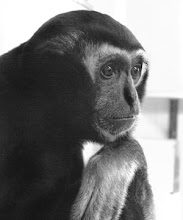‘The future’ has proven itself to be a junkyard, littered with dead-ends and unfulfilled promises. Jetpacks, hovercars, salvation and/or destruction by alien intelligence (who, it turns out, couldn’t give a rats about us apes) – even those air skateboards from Back to the Future II. As it turns out, time travel is implausible, and space is actually cold, boring, and nausea-inducingly vast.. And am I the only one who considers NASA a wasteful extravagance? The coolest thing that ever happened in the space program was that nappy-wearing psychpath astronaut Lisa Nowak. Who cares if whitey’s on the moon, really? So the future’s over-rated, and space is boring, sure. But more than those two, the most striking imaginative cul-de-sac, the grandest ‘battery failure’ of the past’s futures, has been the death of the robot imagination.
In a recent ‘Slices’ DVD interview, Underground Resistance’s Mike Banks talked movingly about the impact of hearing Kraftwerk as a kid: “When we were kids and we listened to Kraftwerk, we thought they was robots. We figured ‘Hey man, this is some cool shit’ and the guys was robots. We never thought ‘black Kraftwerk’ or ‘white Kraftwerk’ – it was just ‘Kraftwerk’. And the shit was funky and it permaeated the inner city.” It’s cute imagining ‘lil Mike dreaming of robots, but boyish chuckles aside, what’s so touching about the comment is the bitter, metallic taste it leaves in my all too human mouth. Fact is, we gave up dreaming of a future filled with electro-hearted robots in the mid ‘80s.
Tokyo was always the place to go and dream of robots – this is the city, after all, that created Astro Boy. And just like ‘2001: A Space Odyssey’ was set in the improbable recent past of six years ago (a year marked by a lot of things, but not by jealous, vengeful robots named Hal 9000), so Astro himself was meant to have been born in 2003, in Takadanobaba, of all places. Takadanobaba might sound like the name of an ‘end of level’ boss to be defeated in a Nintendo game, but it’s actually a faded, glum, crowded inner-city Tokyo area between the glowing, glistening metropolii of Shinjuku and Ikebukuro – a place on the tracks between two cities and that’s fallen into the cracks between two mutating, sprawling neon, concrete and silicon realities of the future. They’re realities that are both bleak and entertaining, but whilst the ATMs and ticketing machines do talk to you in a friendly way (more than the locals, at any rate), there are no robots. And especially three clicks down in ‘Baba. It’s the last place you’d expect to see robots created. Middle-aged hookers, undergraduates and obnoxious beer-toting English teachers sure, but not robots. That’s just the happo-shu talking.
But Astro, with his 100,000 horsepower, his jetboot legs and his all-powerful arse-mounted lasers, does survive in Takadanobaba, as a ghostly presence whose spectre haunts the walls of the underpass on murals, and in the jingle, programmed to the melody of the theme tune, that greets the arrival and departure of the trains running north-south between Shinjuku and Ikebukuro. On a cold, rainy Saturday night, between the vomited ramen and backlit signs advertising Irish theme pubs and massage parlours, it’s a forlorn melody. But with your eyes closed and your headphones on, even the most jaded robot-loving commuter could still lose themselves in Tezuka Osamu’s visionary comics, or the high-tech soul of UR, dreaming of Kraftwerk dreaming of robots. Even in ‘Baba. Until the fateful day I saw Kraftwerk’s robots come alive in Tokyo. That was the day my own robot imagination came to dust.
I caught a monorail over Tokyo Bay, to an island reclaimed for the future (from garbage). We went past Sega’s ‘Joypolis’, and saw a father and daughter being jiggled in a simulated ride, wearing ‘VR’ goggles and huge, sharp-toothed smiles. The gig started on time, and Kraftwerk delivered a hyperefficient summary of their greatness, without smiles or interruptions. All the classics, accompanied by an integrated visual presentation, played beautifully – the whole show slickened by the streamlining of digital technology, delivered on three laptops (revealing an imaginative superhighway that has led somewhere). But then, as the climax of the stage show, Kraftwerk unveiled their robots. What were they? Torsos, with jerky metal arms and showroom dummy heads styled after the faces of the group’s present lineup. It was kitsch, it was cute, it was gutting. It did unto my robot dreams ‘Rockin AB’ from the Simpsons’ ‘Duff Gardens’ episode did for hip-hop, democracy and alcohol marketing, all in one break-down. It crushed them, like an empty can.
A robot future was a better future – Mad Mike talks in the same interview about how Kraftwerk came and ‘hi-teched’ the mindset of inner-city Detroit youth, giving the first-wave of techno innovators a dream of a brighter world. But the robots, and their future, never came – Detroit, Takadonobaba – the revolution never happened, then it returned as a cute setpiece in the middle of an erstwhile junkspace. No wonder techno floundered – they were no longer able to dream. Back to you, Mike: “We need some hi-tech motherfuckers to come through. Until that, kiss my ass.”
Originally published in Inpress, March '07
© Peter Chambers 2007
in which the naked chimp is unmasked, his machines debugged, and his bugbears debunked
Subscribe to:
Post Comments (Atom)
Linkxxx

The Author




No comments:
Post a Comment